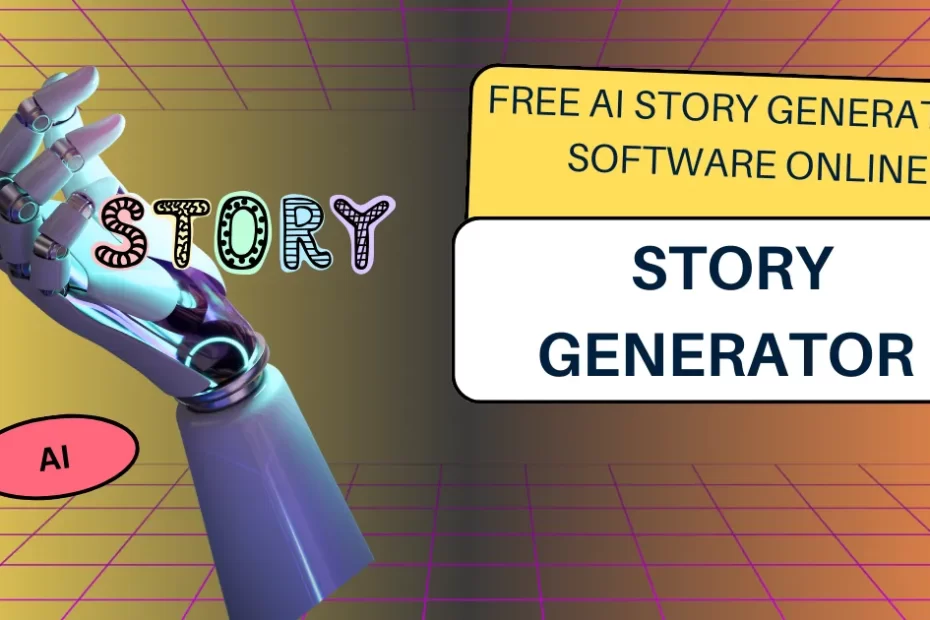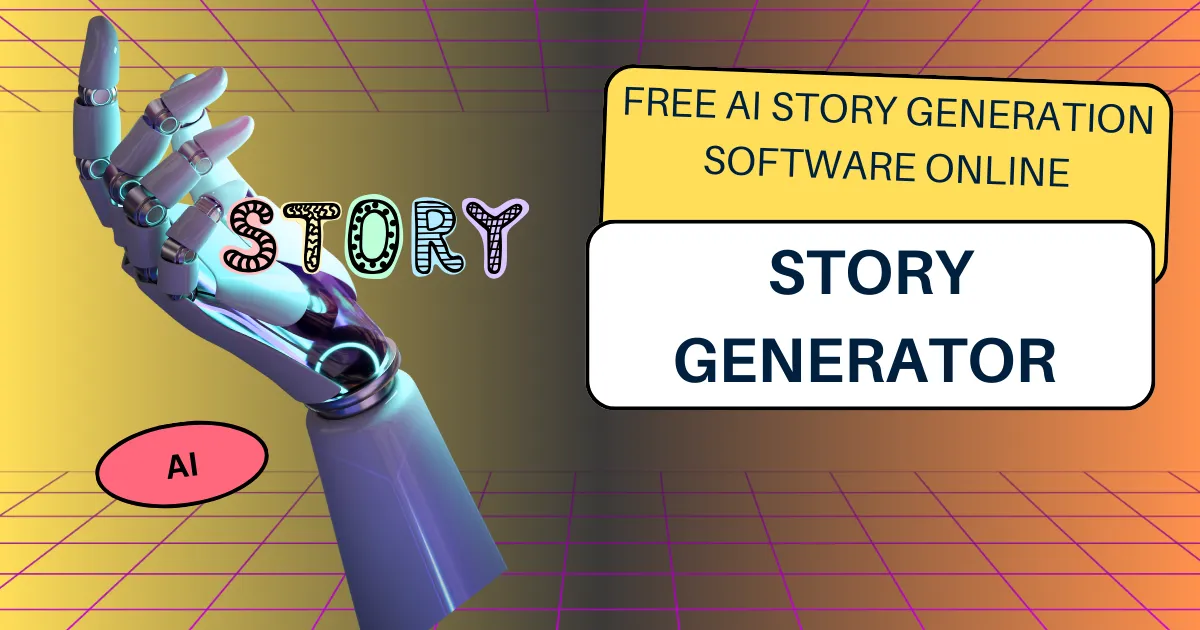What is an AI Story Generator? An AI story generator is a sophisticated software application that leverages artificial intelligence algorithms to create narratives and storylines autonomously. These programs are powered by advanced AI models, such as the transformer architecture exemplified by models like GPT-3.5 (on which I am based) and its successors.
These models undergo extensive training on massive text datasets, encompassing various literary works, articles, and other written materials. This training enables them to learn patterns in language, including grammar, syntax, style, and narrative structures.
How AI Generates Stories:
The process of AI narrative generation involves the model analyzing and internalizing the intricate relationships within its training data. When provided with a prompt or initial input from a user, the AI uses its learned understanding of language to predict and generate subsequent text that is contextually relevant and often surprisingly coherent. It attempts to mimic human writing styles and can produce various forms of storytelling, from short tales to more extended narratives, and even different genres.
The Current State and Nuances:
While AI story generators have made remarkable strides in creating engaging and structurally sound narratives, it’s crucial to acknowledge their inherent limitations. Unlike human authors, AI lacks genuine personal experiences, emotions, and subjective understanding of the world. Consequently, while AI can generate text that resembles creativity and emotional depth, it doesn’t originate from lived experience or conscious feeling.
Therefore, while AI can be a powerful tool for brainstorming, drafting, and even generating compelling narratives, the output may sometimes lack true originality, profound emotional resonance, or the nuanced insights that often characterize human storytelling.
The best results frequently emerge from a collaborative process combining human creativity and editorial oversight with the AI’s generative capabilities. As AI models continue to evolve, we can expect further advancements in their storytelling abilities, but the fundamental difference in their origin of understanding remains a key consideration.
Every story starts with a spark—ignite it with AI!
AI-generated stories can be used for various purposes, including creative writing, content generation, and entertainment. They provide a tool for users to quickly generate story ideas, outlines, or even full-fledged narratives. However, human input and editing are often needed to refine and enhance the generated content to make it more engaging and coherent.
Benefits of AI Utilization – Automated Storytelling
1. Endless Creativity: AI-powered storytelling can produce infinite, unique, and creative stories. With their advanced algorithms and deep learning capabilities, these tools can generate narratives that captivate readers and keep them engaged.
2. Time-Saving Tool: Writing a story from scratch can be time-consuming. However, with an AI story generator, writers can save valuable time by quickly generating story ideas and plotlines. This allows them to focus on other aspects of their writing, such as character development and dialogue.
3. Inspiration on Demand: Sometimes, writers may find themselves stuck in a creative rut, struggling to develop new story ideas. AI story generators can provide instant inspiration by generating various story prompts and concepts. This can be especially helpful for writers who are experiencing writer’s block or looking to explore new genres.
4. Customization Options: AI story generators often come with customization options, allowing writers to tailor the generated stories to their needs. Writers can input specific parameters such as genre, character traits, or plot elements to create stories that align with their vision.
5. Learning Tool: AI story generators can be valuable learning tools for aspiring writers. By analyzing the generated stories, writers can gain insights into narrative structure, pacing, and character development. This can help them improve their storytelling skills and enhance their understanding of the craft.
6. Collaborative Writing: AI story generators can facilitate collaborative writing projects by generating story ideas that multiple writers can develop further. This can be a fun and interactive way for writers to collaborate and create unique stories.
7. Versatility: AI story generators can be used across various mediums, including books, screenplays, and video games. Their versatility allows writers to explore different storytelling formats and adapt their ideas to different platforms.
In conclusion, AI story generators offer many benefits for writers, from saving time and providing inspiration to enhancing storytelling skills and facilitating collaboration. These tools are revolutionizing the creative writing process and opening up new possibilities for writers to explore.
AI Story Generator – Create Worlds, Weave Tales, and Inspire Hearts.
The landscape of creative writing is transforming with the integration of Artificial Intelligence (AI). AI tools, designed to augment the creative process, are not just facilitating writers but also redefining the boundaries of storytelling.
1. Idea Generation and Plot Development: One of the most significant contributions of AI in creative writing is idea generation and plot development. AI algorithms can analyze vast datasets of literary content to suggest original plot ideas, character arcs, and even genres that a writer might not have considered. This can be particularly beneficial for writers experiencing creative blocks. AI doesn’t just suggest random ideas; these suggestions are often based on analyzing current trends, genres, and reader preferences, making them relevant and timely.
2. Language and Style Enhancement: AI tools are equipped to enhance language and style. They can suggest more vivid descriptions, alternative word choices, and diverse sentence structures. For writers looking to refine their narrative voice or experiment with different writing styles, AI can act as a digital thesaurus, offering synonyms and phrases that maintain the writer’s original tone while enriching the text.
3. Grammar and Syntax Correction: AI offers practical support in grammar and syntax correction beyond creative assistance. Advanced AI writing assistants can detect nuanced grammatical errors and syntax issues that traditional word processors might miss. This ensures that the final manuscript is creatively strong and linguistically polished.
4. Theme and Emotional Tone Analysis: Some AI tools go a step further by analyzing a piece of writing’s emotional tone. They can provide insights into whether a story consistently conveys the intended mood and emotional impact, helping writers maintain thematic coherence throughout their work.
5. Audience Engagement and Feedback: With AI, writers can gauge how an audience might receive their work. AI-driven analytics can predict reader engagement and feedback, providing writers with a unique opportunity to tailor their work to their target audience before publication.
6. Time Efficiency and Productivity: AI tools significantly reduce the time needed for research, editing, and revision. This efficiency allows writers to focus more on the creative aspect of their work rather than getting bogged down by the intricacies of editing and formatting.
In conclusion, AI in creative writing is not about replacing the writer but enhancing creativity, efficiency, and effectiveness. These tools provide writers an exciting opportunity to push the boundaries of their imagination and craft stories that resonate deeply with their audiences.
Are AI-generated stories unique and engaging?
AI-generated stories can be unique and engaging to a certain extent, but the quality and level of engagement can vary widely. The uniqueness of AI-generated stories often depends on the algorithms and training data used to create them. AI models like GPT-3 (which powers this response) can generate human-like text and mimic various writing styles, making them appear unique.
However, the engagement level of AI-generated stories may not always match that of human-created content. AI lacks true creativity, emotions, and a deep understanding of human experiences, which can result in stories that feel formulaic, lack depth, or miss the mark regarding emotional resonance.
Here are some factors to consider regarding AI-generated stories:
Content Purpose: AI-generated stories are often used for specific purposes, such as content generation for websites, chatbots, or automated news summaries. In such cases, their primary goal is to provide information or answer questions rather than engage readers emotionally.
Quality Control: The quality of AI-generated stories can vary based on the training data and fine-tuning. Some AI-generated content may be high-quality and engaging, while others may contain errors or lack coherence.
Human Touch: Many organizations use AI-generated content as a starting point and then have human writers or editors review and enhance it to make it more engaging and tailored to their audience.
Genre and Style: AI can be trained in various genres and styles of writing, but its understanding of these genres may be limited. It may not fully grasp nuances, humor, or cultural references that human writers can incorporate to engage readers.
Audience Perception: Whether AI-generated content engages depends on the audience’s perception. Some readers may not notice any difference, while others may find AI-generated content less engaging due to its lack of authenticity.
AI-generated stories can be valuable for content generation and automation, but their uniqueness and engagement level can vary. They are most effective with human oversight and editing to ensure quality and alignment with the desired audience’s expectations.
AI Story Generator - Try it - Free
I use Story Generator and the WebP image format.
While they might not have a direct, inherent relationship, here are a few potential connections and scenarios where they could interact:
1. AI-Generated Stories with Visual Elements:
- AI Creating Content for Web Platforms: If an AI story generator is used to create content for websites or blogs, those platforms often utilize WebP images for their efficiency and quality. Images might accompany the AI-generated story; to optimize the user experience, those images would ideally be in WebP format.
- AI Suggesting or Generating Visuals: Some advanced AI story generators might even suggest or, in the future, directly generate visual elements to accompany their narratives. If these visuals are intended for web use, the AI could be trained to output or recommend saving them in the WebP format for better loading times and bandwidth usage.
2. WebP Images as Inspiration or Input for AI Story Generation:
- Visual Prompts: An AI story generator could use images, including those in WebP format, as prompts or inspiration for its stories. The AI could analyze the image’s content (objects, scenes, emotions) and weave a narrative around it.
- Training Data: While less direct, WebP images, as a standard format on the internet, could be part of the vast datasets used to train multimodal AI models that understand text and visuals. This training could indirectly influence how the AI generates stories that might be paired with web-friendly images.
3. Optimizing Visuals for AI Story Presentation:
- Web-Based Storytelling Platforms: If AI-generated stories are presented on web platforms with integrated visuals, WebP images would be a logical choice to ensure fast loading times and efficient data transfer for users accessing the AI’s creations. This enhances the overall user experience of engaging with the AI-generated content.
The link isn’t a fundamental dependency or a direct cause-and-effect relationship. Instead, their connection lies in the practical context of creating and delivering AI-generated stories on the web. WebP is a web-optimized image format. AI story generators often produce content that ends up on the web, where efficient media formats are crucial for performance and user experience.

Tips for Better SEO
Just because you’re passionate about your latest project doesn’t mean everyone will share that excitement!

Tips for Better SEO
Success isn’t about doing everything at once but mastering one thing at a time !!!!.

Tips for Better SEO
Focus your energy and make it count! You can only do so much; choose one goal or idea and give it your all.

